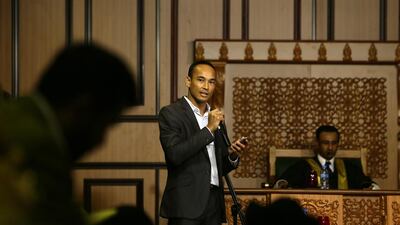DUBAI // Stretched school budgets should be spent on recruitment, training and better salaries for teachers rather than bringing “wasteful and unnecessary” technology into the classroom, an education forum has heard.
The effect of technology has been overstated and is of little value if the basic infrastructure of a school is not in place, delegates at the Global Education and Skills Forum at The Atlantis hotel were told on Sunday.
“The question we have to ask ourselves is if investing in technology in the classroom is the right thing to do with our finite budgets, and I would say no,” said James Centenera, founder of the Tula after-school learning centres in the Philippines.
“Technology only works if other essentials are in place and when you have classrooms without creature comforts like heating or even enough teachers in most places around the world, then we have to shift our priorities.”
The forum debated the idea that technology in the classroom is a waste of time and money. The topic was sparked by a report from the Organisation for Economic Co-operation and Development which said technology does little to bridge the skills divide between advantaged and disadvantaged students.
According to Fortune Magazine, global spending on technology in classes will surpass $19 billion by 2019.
On average, India spends $243 per student per year, in the Philippines it is $176 and $91 per school child annually in Ethiopia, said Mr Centenera.
“Teachers are some of the lowest-paid professionals in the world and in some places they get below a country’s minimum wage,” he said.
Only when technology is mature enough and there are more teachers and better curriculums should it play a more central role in learning, Mr Centenera said.
Antony Jenkins, board member of technology company Blockchain and former chief executive of Barclays, likened the issue to the tale of the Emperor’s New Clothes.
He said technology companies constantly required money to be spent on upgrades and in the end there was little to show for it.
“The problem with technology in the classrooms at the moment is that they more often than not it’s there to make money for the technology companies,” he said.
“We should divert our resources to what matters most and that is trained teachers and more of them.
“You look at whiteboards, there is no need for them, do they do anything differently to what a teacher with a blackboard and chalk couldn’t do?” he said.
Munira Rajkotwalla, a pupil at Gems Wellington Academy, countered their arguments with her own positive experience of using technology in school.
She is one of 50 taking part in a blended learning scholarship programme where pupils are taught through online classes.
“This has made a huge difference to my learning and in a survey of the other students in my class and those using traditional means we were on average higher marks in our IB [International Baccalaureate],” she said, adding that technology can even make students’ study time more efficient.
“We also asked them how many hours they study outside of school per week and those using technology were on average doing 15 hours while pupils working in traditional methods had 55 hours.”
The benefits of technology were that it was flexible and could help take the load off teachers.
“In refugee camps in Syria where there are very few teachers a laptop could help to give children access to education they would not normally get,” she said.
Her debating partner Zak Khoury, regional director of International organisations at Microsoft, UAE, said it was essential children knew how to use technology.
“Innovation is constantly happening and we have to give children the ability to adapt to that fast moving change,” he said.
“It’s not a case of either we have teachers or we have technology we can have both.”
nhanif@thenational.ae

